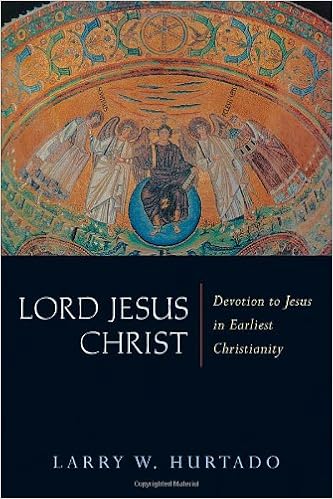
Editor’s note: This post originally appeared on Think Apologetics. Tabernacle of David considers this resource trustworthy and Biblically sound.
.
For those that may not know, New Testament scholar Larry Hurtado recently lost his battle with leukemia. I was saddened to hear this and I as I look back over the last several years, Hurtado’s work on early Christology was a huge blessing to me. If you have never read any of his books, a few stand out here.



The earliest records we have for the Christology of Jesus are Paul’s letters. And 1 Cor. 15:3-8 and 1 Cor. 11:23 along with other, short Christian creeds include II Timothy 2:8, and Romans 1:3-4 show that the core teachings of the Gospel (Jesus died for our sins and rose again) pre-date Paul. Hence, the core of the Gospel was being circulated very early and even before Paul was a believer.
Let’s look at Paul’s statement in 1 Corinthians 8: 5-6:
“For though there are things that are called gods, whether in the heavens or on earth; as there are many gods and many lords; yet to us there is one God, the Father, of whom are all things, and we for him; and one Lord, Jesus Christ, through whom are all things, and we live through him.”
Here is a distinct echo of the Shema, a creed that every Jew would have memorized from a very early age. When we read Deuteronomy 6:4-9, which says, “Hear O Israel! The Lord our God is our God, the Lord is one,” Paul ends up doing something extremely significant in the history of Judaism.
A glance at the entire context of the passage in 1 Corinthians 8:5-6 shows that according to Paul’s inspired understanding, Jesus receives the “name above all names,” the name God revealed as his own, the name of the Lord. In giving a reformulation of the Shema, Paul still affirms the existence of the one God, but what is unique is that somehow this one God now includes the one Lord, Jesus the Messiah. Therefore, Paul’s understanding of this passage begets no indication of abandoning Jewish monotheism in place of paganism.
For a Jewish person, when the title “Lord” (Heb. Adonai) was used in place of the divine name YHWH, this was the highest designation a Jewish person could use for deity. Furthermore, it would have been no problem to confess Jesus as prophet, priest, or king since these offices already existed in the Hebrew Bible. After all, these titles were used for a human being. There was nothing divine about them.
Hurtado describes the early devotion to Jesus as a “mutation.” One of the primary factors that Hurtado presents for the cause of this “mutation” in the context of Jewish monotheism is the resurrection itself and the post-resurrection appearances. Some of the features in the early Jesus devotion are as follows:
First, there are hymns to Jesus ( Col 1:15-20; Phil.2:5-11) which are exalted things about him done in song.
Second, there are prayers to Jesus: we see prayer to Jesus in prayer-like expressions such as “grace and peace” greetings at the beginning of Paul’s letters and in the benedictions at the end. Also, the early followers of Jesus are seen “calling upon” the name of Jesus as Lord (Acts 9:14, 21; 22:16;1 Cor. 1:2; Rom. 10:13), which is the same pattern that is used in the Hebrew Bible where it refers to “calling upon the Lord” (Gen. 12:8;13:4 ;21:23 ; 26:25; Psalms 99:6;105:1; Joel 2:32).
See his lecture here which is called “How did Jesus become a God.”
Hurtado will be greatly missed. I appreciated his scholarship on the early Christology topic.

